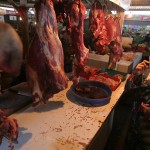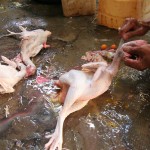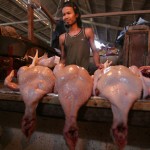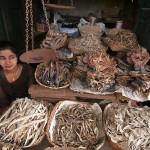DO you unnecessarily kill animals? Do you eat meat? We often consider these to be two different questions. I don’t believe they are.
Many upstanding citizens who would not hurt a fly eat deli meats or Big Macs quite comfortably. They would never kill a living thing but have no trouble enjoying a chunk of flesh that was killed to meet their demand.
Whether or not one should eat meat is a moral and ethical question that, for most humans, gets overlooked. If one just eats meat for pleasure, is that just?
I must dispel the myth that eating meat is a health requirement. I am a 190 cm, 200 pound vegetarian. When I announced my decision to become a vegetable eater only, people told me I would turn to skin and bone. Sorry doomsayers, that didn’t happen.
Today’s humans don’t eat chicken or beef. We eat nuggets and burgers. The majority of our produce comes packaged, and we never have to face our meat before it’s delivered to us.
This is precisely why movies like Food, Inc (2008), Meat the Truth (2008), Earthlings (2005) and Shark Water (2006) are difficult to watch — facing reality is painful.
When I was a camp counsellor in Canada in my teens, I would get my campers to catch, clean and cook fish because I believed it was an important experience to have. Meat-eating city kids find this experience rather shocking. Never before had they met their meat. Many of us in cities like Kuala Lumpur have not either.
In this collection of photographs, we see a side of Asia that is still in touch with its meat. The protagonists in these pictures are just providing for their families. For a city dweller, these pictures might likely be dubbed “gross” or “graphic”. For me, they are real. Modern factory meat production happens behind closed doors. In these photographs, the doors are wide open.
Do you need meat, and if you do, are you willing to get to know it? ![]() _________________________________________________________________________________________
_________________________________________________________________________________________
Colin Boyd Shafer did enjoy the taste of meat but could no longer do so once he considered the choice from an ethical and environmental standpoint. All photos and captions are his.



















Sharon Saw says
Thank you for highlighting this huge but usually ignored issue. Society is so ingrained into eating meat that we never consider how the meat ends up on our plates. i have friends who cannot eat meat if the heads are still on – the fish, duck, chicken, pic etc. I’m thinking that’s even more of a reason to leave the heads on if you can’t hack it because guess what – all the meat you’re eating HAD a head…
Anyway, I hope your gallery of photographs will lead people to reconsider what they are eating.
P.S. Have you been to Kechara Oasis vegetarian restaurant — it’s good for animals, good for us and delicious!
Reza says
I do not see what’s wrong with eating meat. We all have our preferences. If you can live with vegetables only, then good for you. But others like myself enjoy meats and there is nothing unethical about it. Seriously, you animal lovers speak about animal slaughter as though we are harming sentient beings equal to ourselves.
Now, I am by no means condoning unnecessary acts of cruelty towards animals, but I see nothing wrong with animal slaughter for food. Humans have been doing it since early man. Animals do it to other animals. And when animals do it, it’s called the “natural, ecological order of things”. Well guess what? As living creatures on this planet, human beings are also part of this food chain. We were part of it when we were primitive and we are still a part of it now. Being more civilised and evolved does not take us out of the picture. God made us with a natural inclination to consume meat the same way he made herbivorous animals with a preference for only plants.
However, I do think that slaughter should be done as quickly and as painlessly as possible so as to minimize the animals’ suffering. I also do not condone the slaughter of endangered animals.
Finally, your argument that most of us aren’t comfortable ‘meeting’ our meat is weak. Most people do not like to see messy innards and blood anyway. I don’t. At one time in our early primitive history we didn’t have a problem ‘meeting’ our meat, we couldn’t afford to if we wanted to survive. Industrialised food processing has sensitised us to what was once a natural and necessary survival skill: hunting and killing. So this doesn’t make animal slaughter any more wrong or unnatural.
ismail. says
If you want to tell yourself that God made you feel like “that” so you have the right to do “that”, I hope you realise the harm in such an argument.
Just because theirs is an inclination does not mean it is right.
Just because something feels natural does not mean it is right.
Reza says
It is not so much that God made us “feel like that”, but that is just part of our natural physiology. If you ever studied basic biology, you would know that all animals, including humans, are divided into three categories with regard to our food preference: carnivores (meat eaters), herbivores (plant eaters) and omnivores (plant and meat eaters). Humans fall into the category omnivore, so we were ‘built’ to take in both plants and meat. Ergo, there is nothing wrong with us eating meat.
You want to be a full-fledged vegetarian, go ahead, it is your rightful choice. But where do you and the author get the audacity to tell us meat eaters that what we are doing is wrong? Neither you nor the author has sufficiently justified, in my opinion, why eating meat is wrong. You guys are just as bad a religious fanatics, telling people that what they are doing is wrong just because they have a different point of view of lifestyle from yourselves, when in fact there is nothing wrong about it.
neptunian says
Reza, you got to be kidding about the “lack of suffering” in the Muslim way of killing animals for food. Have you actually seen a chicken being slaughtered or a goat, or a cow, the Muslim way?
I suggest you […] go visit a kampung nearby to watch the dear old mak cik slaughter a chicken or two. I won’t describe it here, as it may upset a few readers. (BTW, I am a meatarian and I grew up in a kampung.)
Reza says
I didn’t say there was no suffering at all. But the suffering is supposed to be minimal because the animal is given a quick death.
Lainie Yeoh says
I think it’s important to find out where our foods comes from — not just the part where meat comes from animals, but whether even the plants we eat come from sustainable/environmentally-friendly farming practices.
Mooreyameen says
You’ve eaten your share of meat and NOW you tell people not to eat meat based on ethical and environmental standpoint? Isn’t this like how the West has cut down all its trees and industrialised, and start telling the developing countries that they must preserve the forest and jungles because of the environment? Not everyone has the luxury of growing to a strapping 190cm, 200 pound person – in fact, most of the people in your pictures are probably shorter and much lighter than you. If it wasn’t for your earlier meat diet, and probably the meat diet of your family the few generations before you, you probably won’t be able to grow to a 190cm 200 pound man that you are today. It just seems unfair (and possibly unethical) for you to have reaped the benefit of generations of eating meat, and now start telling others to stop eating meat because it does “nothing” for you. Really?
ismail. says
I am pretty sure the author is not the size he is because of meat.
It is frustrating when someone from the West is unable to say things in this country (and be heard) because people put up a mental wall. He didn’t cut down trees, and he didn’t colonise Malaysia.
Listen.
Andrew I says
Adults may choose to become vegetarians, but to impose this way of life on growing children is unfair. I’ve seen children on vegetarian diets and they look pretty pale and frail to me.
Then there are the vegetables dishes offered as consolation meat dishes. I find that they taste quite awful.
I like my greens, raw most of the time. And when I eat meat, it’s usually a mouthful followed by a mouthful of veg.
Lainie Yeoh says
(For those who wish to learn more about what they eat, reading Michael Pollan’s The Omnivore’s Dilemma is an easy start)
Omnivore says
I think it is a very luxurious stance to take that affords one the privilege to be “ethical” about one’s dietary choices. A lot of people, including most of the people in your photos, have little to no choice about the foods that they eat. Calories are calories, and I would be surprised if ethics enter into it. While I agree that we do not entirely connect the food on our plates to the realities of the farm or slaughterhouse, does this disconnect not exist between MOST if not ALL other products we consume? How do you know that your camera was ethically produced? How about the shoes on your feet and your belt? There are some sketchy things going on in China… own anything made there? Do you consume eggs or dairy? What makes consuming those products ethical, but eating of the whole animal unjust?
I understand and agree with your argument from an environment/sustainability/diversity perspective. Fine. There are problems with how we raise and harvest our meat products, but again, to be choosy about this is a luxury. But imploring others to be “ethical” about eating meat is an argument that verges on religious dogma, and reduces a fairly complex argument to a two-sided discourse with me on one side and you on the other.
jeff says
And you wrote this on a computer, Omnivore. This is not a photo essay about the ethics/environmental impacts of cameras. The author’s argument is, if you can not eat meat (which I am guessing you could live without), it is better not to.
You choose to bring in all these other random ethical questions because your dietary choices are unethical and the author makes you feel uncomfortable.
Animal agriculture has a 40% greater impact on global warming than all other transportation combined. – Jonathan Safran Foer’s Eating Animals
Omnivore says
On the contrary. While I do eat meat, I try make make the most environmentally sound choices I can – wild, local or free range. I raised the point about other products because if one feels that they need to be ethical about where their food comes from, shouldn’t they be concerned about where other products they consume come from, especially when some of those questions pertain to the treatment of animals?
The author’s argument does not make me uncomfortable. What I am reacting to is the holier-than-thou attitude of those vegetarians who choose to be vegetarians because of ethical issues. I have no issue with vegetarians who choose to give up meat for health or environmental reasons; in fact, I have no problem with Colin’s stance that he has given up meat for ethical reasons. What I do take issue with is the preachiness of those who imply that those who do eat meat are acting unethically. I fully understand where meat comes from, and choose to eat meat anyway. I do, as I said, try to make choices along the lines of environmentalism and sustainability. I also fully believe that eating meat is natural, and not therefore does not violate any code of ethics that I subscribe to.
Reza says
Well said!
Sonia says
Reza misses an important point. There is nothing natural about today’s meat industry. It is large-scale and involves massive cruelty and animal suffering. It contributes to both global warming and makes it difficult for us to feed the entire world’s population*.
If you, Reza, go out, hunt and kill your own food, I apologise – but the point still stands. What we do to animals to make meat is unnatural. In itself that isn’t an argument not to do it. The cruelty involved in the production of dead animal flesh for human consumption is.
Sonia
*(Though if anyone makes the point that the problem is primarily one of trade and power imbalances, I’d be inclined to agree – but the only way we can actually meet the food demands of the entire world is when the money paid to feed a Western cow is less than the money taken to feed a Southern person.)
Reza says
If you are merely talking about the processes of how we go about preparing meat, and not eating the meat itself, then you might have a point. I do not really know enough on this issue to make an informed opinion. I was just defending my right to consume meat. But to be fair, the author was not just talking about how we process meat. It is clear from his article that he frowns on the consumption of meat as well.
Coming back to the issue of food processing, I think that this is why halal food preparation procedures are better for meat processing as Islam does not condone unnecessary cruelty and suffering of animals. For instance, the way Muslims ‘sembelih’ is meant to give the animal a quick death with minimal suffering. Maybe there are other quicker and less painful methods, I don’t know. But anyway, I am glad that halal food manufacturing is slowly gaining a foothold in the global food industry. Many countries are beginning to see the benefits of halal food preparation, not only from the animal cruelty perspective, but also because of the high standards of hygiene. For this reason, I applaud the Malaysian government’s efforts to promote Malaysia as a global halal hub.
max says
On the subject of Muslims killing animals and the issue of halal, I once saw Muslims slaughter a cow in a car park (just after Hari Raya). I found it particularly painful for the cow, being pinned down and having its throat slit, wailing while waiting for the blood to slowly ooze out, before resigning to becoming food.
On another note, do you realise that by right, seafood – i.e. fish, crab, prawns, clams etc – are all very unhalal as they swim in [the waste of] other animals, and that dead animals are floating about in the ocean every day…?
jeff says
Ethical “unnecessary cruelty and suffering of animals” halal food, like the idealistic American small farm, is not the reality. Like any-large scale food processing, it is done quickly and to maximise profits. I don’t believe most underpaid labourers would be upholding the idealised way of keeping it halal. Don’t let that give you peace of mind in eating meat, unless you see the whole process and feel good about it.
Reza says
I agree that the way we slaughter and process meat needs to be improved. Ideally, I would rather the animals did not suffer unnecessarily. Ideally. But, lets face it. Most meat eaters like me are still not going to be deterred from eating meat just because some non-sentient lower life forms are suffering. Boo-hoo. It doesn’t even come close to the level of using products made in some sweat shop by underprivileged children working in unbearable conditions in an impoverished third-world country. In this example, the lives of sentient, conscious, thinking beings are involved.
JW Tan says
The accepted painless way in most Western abbatoirs is to stun the animal (by carbon dioxide gassing or electrocution), then kill it (either by cutting its jugular vein and carotid artery, or by firing a bolt into its head).
Rendering the animal unconscious is not part of the halal slaughtering practice, because there is a question mark over where death actually occurs. It should be.
ASH says
Reza,
You must most definitely be one of those guys the writer was talking about – those who do not see their meat or at least how that meat was killed before it arrives on your table. Why don’t you take a blade and run it down the length of your arm or leg making sure the blade cuts into the surface of your skin. You need to do this as slowly as possible. Next, wait for the blood to ooze from the whole length of the cut you made. Tell me that you feel no pain […]
Reza says
ASH,
Yes, I am one of those who do not “meet my meat”. But the point that I have been trying to make in my previous posts, and which seems to be completely lost on you and the other obviously FANATICAL animal lovers, is so what if I don’t meet my meat?
Yes, I know animals suffer so that we can consume their meat. And I have already stated that, preferably, we should find less painful ways of slaughtering them. But even if they do suffer, so what? They are NON-SENTIENT, NON-SELF-AWARE, LOWER LIFE FORMS whose perception and experience of suffering is vastly different from that of sentient, conscious human beings. So there is no point in asking me to mutilate myself just so I know what its like for animals. Comparing harming animals to harming humans shows an utter lack of reasoning. Apples and oranges.
JW Tan says
Meeting your meat is a good way to teach yourself that living your life has a real cost to other creatures. It’s a humbling experience. I recommend it to all meat eaters. Not that it’s meant to convert you to a vegetarian (it didn’t do for me) but it makes you more appreciative of what eating meat means, in terms of your own health as well as the wellbeing of the creature destined for your dinner plate.
Also, the difference between harming animals and harming humans is merely a matter of degree. We are, after all, animals ourselves, and labelling other animals as “lower”, “non self-aware” is false, when they are actually LESS intelligent and LESS self-aware than we are. Appending these false labels make us feel better about what we do to them. But they are false.
chong says
I think vegans are going overboard with regards to cruelty to animals. Plants are living things too and would not like to be eaten. Just because we can’t hear them scream and see blood dripping from them does not mean that they do not feel pain. The pain they experience may be beyond our comprehension. Basically humans consume meat, veggies etc. as a means of survival.
Annabelle says
The images posted here are nothing new, I believe – I myself have seen it countless times in markets, and even when my family raised, we slaughtered chickens, turkeys and quails for consumption. I’ve never had a problem ‘meeting my meat’, so to speak, and I am sure many Asians share this reality.
N Lee says
Need the protein in the diet. As it is, meat isn’t a primary source of energy. Rice is. In fact, meat is more a food flavouring than an actual dish on its own. Small bits that you add to your vegetables.
I think the idea of “eating meat” in a Western diet is rather different from “eating meat” in an Asian diet. Meat isn’t cheap in Malaysia.
jeff says
Malaysians’ per capita seafood consumption is second only to Japan.
[Meat is] only a flavouring? KFC seems to be doing just fine here, bud.
Narayan says
The author has drawn attention to a few things:
1) Take a look at what you eat!
2) Do you feel good about it?
3) If you do not feel good about it, why keep doing it, especially when there are non-meat options available that can make you hale and hearty?
Feel, and do as you feel. This is a interesting approach. None of these things are western, eastern, brown, black or any other label. If, upon deep investigation and looking at these photos — or better still, visiting a slaughterhouse — you still want to indulge in your meat, then go right ahead.
I think many feeling, thinking humans would feel repulsive. Tasting while not thinking is merely being numb. This is not about moralising in the religious sense; it is using the human faculties to act in unison.
Thomas Jefferson: “If you want to change a man, then change his kitchen.”
max says
I’m fixated on eating meat, and get turned off watching animals being killed for my food. So what do i do? Just tuned off the animals slaughtering from my mind
Patrick says
You’re right, actually. I think the fact that we’re more willing to take a bite out of a Big Mac than look at it being slaughtered shows our lack of respect for food. We rather see it packed up in plastic, clean and spotless, nary a drop of blood.
How then would we expect to respect the meat, where it had come from, and the effort that was put in to bring it to the dinner table?
Perhaps we ought to kill our own food. If you become a vegetarian because of it, good for you. But if you decide to remain an omnivore anyway, it would mean that you would be able to stick to your principles.
JW Tan says
I’m a big fan of knowing what you are eating, where it comes from, and what care went into putting it on the table. It’s healthier, and tastier, if you research the source of food and buy better quality because of your better level of knowledge. Part of this is knowing who raised your meat, how it was raised, how it was slaughtered, and so on.
I have found that I am quite happy to kill animals for food. I would probably eat a lot less meat though, if I had to kill all my own meat. It’s too messy, and I would feel obliged to use absolutely every part. While I do like offal, it’s even less healthy than muscle.
Malaysians should have less of the yuck factor than people in the West. After all, we eat all bits of the animal (fish head curry anyone? Chicken feet?) and some of us still raise our own food.
As to whether or not meat eating is ethical – under today’s system of ethics, where people place implicit values on lives (human or otherwise), the act of slaughtering an animal (with the possible exception of chimps, gorillas or orangutans) in a humane way to eat its meat is ethical. Eating too much meat, wasting meat, or causing unnecessary cruelty isn’t ethical. In fact, I find the Muslim / Jewish manner of slaughtering animals (and the korban on Hari Raya Aidiladha) to be very cruel, and therefore wrong. Is there any real value (besides trying to adhere to a religious requirement that itself makes little sense) in bleeding an animal to death?
Adam says
Well, one man’s meat is another man’s poison. We eat to live when we are on a tight budget, and we live to eat when we have the means. It is up to the individual’s preference to be a vegetarian, omnivore or carnivore.
Being vegetarian does not mean one would be skinny and anemic. Just look at the animal kingdom. The giants are the plant and grass eaters while the meat eaters are sleek, slim and agile. The problem with meat-eating folks is that they do not run after and catch their food.That is why they are heavy and usually fat without exercise.
Anyway, eat whatever one enjoys. Just make sure nothing is wasted and your food does not come from dubious sources. If food be the essence of life, eat on…
yo says
I hunt and fish for sport and food. I think it’s a great idea for people to see where their meat comes from, it’s killed, gutted and prepared. I think everyone who eats meat should hunt and kill at least one decent sized animal, a boar or deer in their lifetime, to reconnect with that primal killer instinct that made us top of the food chain.
Kong Kek Kuat says
Oh please… the only thing that´s stopping us from crossing over to cannibalism is that we still have enough food left in this world.
Take away all the meat in this world, and I´ll be looking at my neighbours as my next nouvelle cuisine. It´s not going to stop there, though, coz once my neighbours are done…
…and the list goes on.
CHICKENMAN says
Dear all,
I am fully involved in producing chicken and pig meat for Malaysians. When I read this article, one thing that crossed my mind was that the writer may have lived and grown up in an urban or city area. We all need to understand that all further processed meat such as hot dogs, nuggets, burgers etc. are partially made of meat (maybe 20-40% real meat), and the rest is flour. In Malaysia, we do not specify the content of each common item such as burgers, hot dogs etc., unlike in US or Europe, where the consumer is willing to pay more for better stuff inside.
THERE IS NOTHING WRONG WITH HOW ANIMALS IN MALAYSIA ARE BEING PROCESSED FOR MEAT. City people may not be used to seeing cattle, goats or pigs being slaughtered, and they may think it is not hygienic. But for those living in kampungs, the method is fully acceptable.
My advice is for those who like to buy meat to simply ensure that the livestock is processed hygienically and using halal practices. You may need to go for branded products. If you can accept the wet-market way, that’s fine. The authorities are slowly encouraging the wet markets to improve their handling of their product. It takes time.
Chen says
I keep cats. And cats are by nature carnivorous, hence the need to buy them meat. Cats on a low meat-protein diet are unhealthy. So comes the dilemma of many caretakers of carnivorous pets who want to reduce the intake of meat. How can we allow the animals that we are taking care to suffer in health for a pro-vegetarian cause? Which animals are more important – the ones you have in your home and which you regard as family – or animals that we are strangers to?
Reza says
JW Tan,
I disagree about your distinction between humans and animals. I do not believe me labelling them as not self-aware or not self-conscious is false. Yes we are also “animals”, but we are the only SENTIENT animals on this planet. These are the only two categories, sentient and non-sentient. There are no varying degrees in between.
JW Tan says
Sorry, you’re wrong. Even sentience is a matter of degree. Otherwise how would we be able to communicate with great apes (via sign language) and dolphins (slightly more tricky)? Yet people eat these creatures.
Reza says
Perhaps a more accurate term would be sapience. It is true that some apes, like chimpanzees, and dolphins are relatively more intelligent than other creatures, and can be considered sentient within the full sense of its semantic meaning, but sapient? No, they are not. They may be smart, but not as smart as humans. Also, intelligence alone does not determine sapience. Wisdom and sound judgement are also factors. These are not present in these animals.
In any case, I personally do not condone the slaughter of these animals as many of their species are endangered or nearly endangered. My argument encompasses the more common livestock animals that are bred for consumption.
McD says
I believe animals are sentient/self aware, and I have no problem killing and eating them. As I get older I’ve reduced my meat intake for health reasons, preferring a more vegetable based diet. But I still love a nice rare tenderloin once in a while.
Narayan says
I can accept a simple need, that you like meat and need to eat meat, therefore you eat meat. What is disturbing is the explanation that humans are more sentient or discriminative, therefore by some design animals are meant to be eaten. To those who say thus, please invest sometime with owners of pets and those who care for animals. Almost invariably you would learn that animals respond in their own way the various complex things humans experience. They in fact operate very instinctively and feel pain as intensely.
So go ahead eat meat if you want, but please do not belittle animals. If you need a scientific explanation, invest some time into dolphin and gorilla research. You will see sentience and consciousness quite clearly.
Reza says
The point i’m trying to make is that harming animals is NOT AS BAD as harming humans, because animals are a lower life form. Whether or not you want to admit it, animals are NOT our equals.
Also, dolphins and apes are the exception, not the norm. Just because they may be sentient to a certain degree, doesn’t mean other animals are.
The girl in the red Ferrari says
As mentioned before, please invest some time in research […]! Animals feel, have emotions and are intelligent creatures. […]
I totally disagree with your statement on “harming animals is NOT AS BAD as harming humans”. We respect all life forms, and if there is a need for consumption, then [we] respect them in the sense that [we] do not prolong their suffering. And when [we] kill, [we] kill for food and not for greed.
Humans, as omnivores, have a choice between eating meat and not eating meat. In fact, this whole issue is not about meeting your meat at all. It’s about making a choice, not just based on your whims and fancies, or in this case, your tastebuds, but how much unnecessary suffering an animal goes through just to decorate your plate and palate.
I love my meat, and I have been to the market where chickens are slit and dunked in boiling water. As pointed out in the article, the whole process takes less than 5 minutes from alive to dead (probably less than 3). It may take longer for bigger animals and I don’t agree on bleeding an animal to death as it takes longer for an animal to die.
In that same vein, I dont consume shark’s fin soup because of the manner it is obtained, or exotic meats because of the endangered nature of the species.
Reza says
“We respect all life forms, and if there is a need for consumption, then [we] respect them in the sense that [we] do not prolong their suffering. And when [we] kill, [we] kill for food and not for greed.”
If you’d bothered to read my earlier posts, you would see that I quite agree with your statement. I do not encourage unnecessary cruelty towards animals. And slaughter should only be done primarily for food, preferably with as little suffering as possible to the animal. I also outrightly condemn the slaughter of endangered animals.
When I mentioned harming animals, I meant that in the context of slaughter for food. I wasn’t promoting unnecessary cruelty toward animals.
I agree that most animals feel. But I disagree that most of them are intelligent, especially not domesticated livestock bred for consumption. Even the most intelligent ones are nowhere near the sapience of man.
The point I’m trying to make is that while I would prefer a less painful method of slaughter for animals, I’m still not going to lose any sleep at night for enjoying my meat regardless of how it is slaughtered. After all, how animals are slaughtered is not the fault of the consumer, but the supplier. I don’t think this makes me a bad person. Do some of you honestly expect people to stop eating meat in protest of how they are slaughtered?.
As you quite rightly pointed out, as omnivores we have a choice: meat or vegetables. Neither is wrong. And anyone who says differently is similar to a […] fanatic who claims his [or her] religion is better than others.
Farouq Omaro says
I have tried going vegetarian for three full months. However due to lack of support, I resumed eating meat. And I like meeting my meat. I have slaughtered chickens, and am always around to give a hand when slaughtering goats, cows, buffaloes and others. However I have stopped eating wildlife meat, as I don’t see why humans need to eat them anymore since we have plenty of supply of domesticated animals. And I believe an animal should be killed quickly without giving it a chance to feel pain. But I do not wish to debate slaughter according to religious decrees here. To me how you kill your meat is your own choice depending on your level of sympathy for the animal.
andrewtcrum says
Nice photo series and article, Colin. Well done.